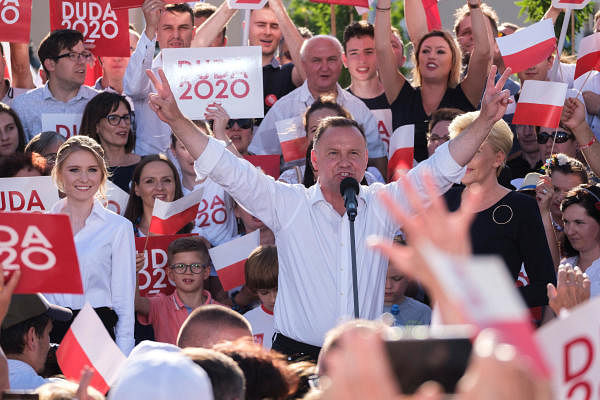
Poles began voting on Sunday in a knife-edge presidential election between a populist incumbent closely allied with US President Donald Trump and a europhile liberal who wants to restore ties with Brussels.
The result will be decisive for the future of Poland's Law and Justice (PiS) party government, which critics accuse of rolling back hard-won democratic freedoms three decades after the fall of communism.
President Andrzej Duda, backed by the PiS, is facing a challenge from Warsaw mayor Rafal Trzaskowski of the opposition Civic Platform (PO) party and the latest polls show an almost even split between the two.
"The Battle for Poland", read a front-page headline in the tabloid Super Express. The liberal daily Gazeta Wyborcza said the choice was between "hope and disaster" and would resonate for generations.
The vote had been due in May -- at a time when Duda was riding high in the polls -- but was delayed because of the coronavirus pandemic.
Duda's support has slipped considerably since then, partly because of the virus fallout, which is pushing Poland into its first recession since communist rule.
Polls opened at 05.00 GMT and will close at 19.00 GMT, with an exit poll scheduled shortly after that and the first official results only expected Monday morning.
Experts are warning that Sunday's result could be so close that legal challenges and protests will ensue.
In the first round on June 28, Duda came first with 43.5 percent and Trzaskowski second with 30.4 percent.
But Trzaskowski will be hoping to sweep up votes from Poles who supported other opposition candidates.
Eurasia Group, a political risk consultancy, said he has had to mobilise very disparate parts of the electorate against Duda and the incumbent would therefore likely win, though by a narrow margin.
"Trzaskowski proved an able and eloquent campaigner, but two weeks is a short time to bridge Duda's lead," it said, pointing to a "lack of clear support" for him from opposition candidates who lost in the first round.
Duda has promised to defend popular social welfare payments pushed through by the PiS government and has campaigned on divisive issues, criticising LGBT rights and Jewish wartime compensation claims.
"The upcoming elections are a clash of two visions of Poland, the white-red and rainbow-coloured," Justice Minister Zbigniew Ziobro told the Polish news agency PAP on the last day of the campaign -- a reference to the colours of Poland's national flag and the symbol most widely used by the LGBT community.
The government has also lashed out at German-owned media, accusing them of "bias" in the election after a tabloid owned by the Ringier Axel Springer Group published a story about Duda pardoning a paedophile.
Trzaskowski promises a very different Poland.
He has said he will roll back controversial reforms of the judiciary that have put the country on a collision course with the rest of the European Union.
Trzaskowski has also expressed support for allowing same-sex civil partnerships in Poland, although like Duda he opposes adoption by same-sex couples.
A Trzaskowski victory could begin to unravel the influence of PiS in Polish politics.
A Duda win, on the other hand, would cement the party's power.
"This election will determine Poland's fate for the foreseeable future," said Adam Strzembosz, a former Supreme Court chief justice and highly respected professor of law.
"Will it be dominated and completely subservient to a certain political party, with all the consequences of power that is dictatorial in nature? Or will we manage to stop this?"